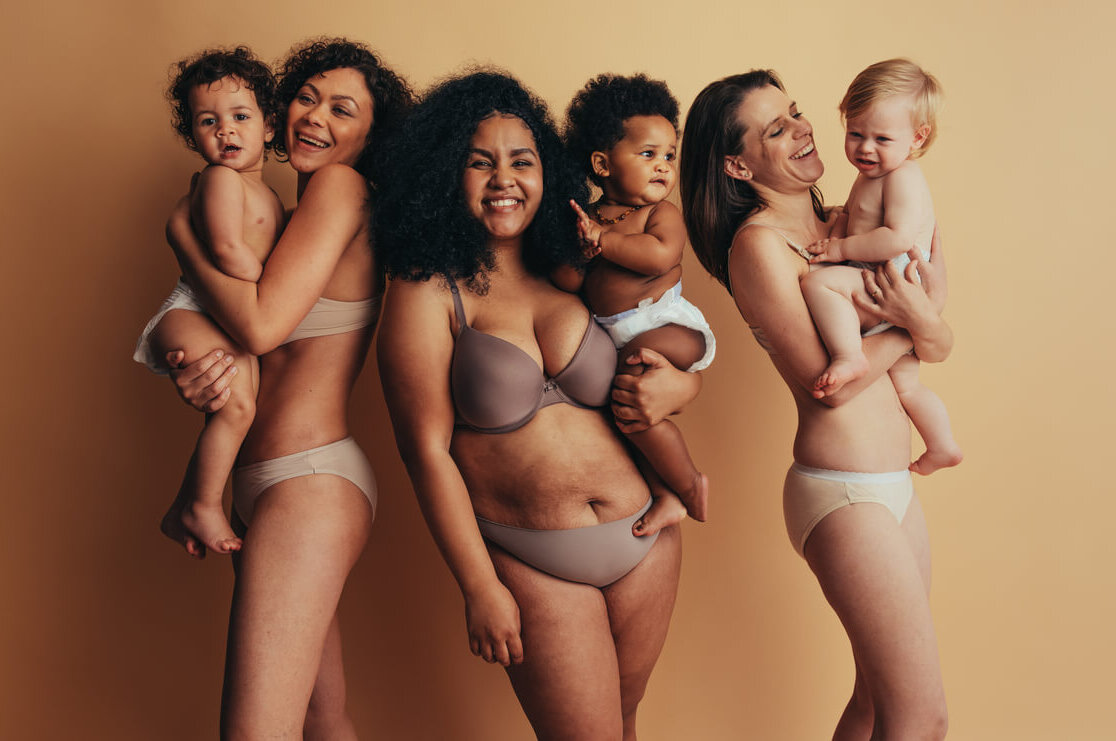Is It Good for Your Child to See You Naked?

The human body, in all its forms, is still a taboo in society. In some cases, it’s even difficult to name certain parts, such as the genitals. In others, those who show a slim figure are praised (regardless of the context of that slimness), and the excess weight of certain people is criticized. Many battles are fought over the body and one of them has to do with a classic question that accompanies the upbringing of children: Is it good for your child to see you naked? To answer it properly, we’ve prepared the following article carefully, respecting the nuances to avoid falling into a simplistic and probably erroneous logic. Will you join us?
Some keys to reflecting on bodies
First of all, it’s important to keep in mind that children have no prejudices or formed ideas about the body. What they learn about it is what they receive from their environment. Therefore, it’s also an important exercise to ask oneself the following questions: What do I think about my body and that of others? Do I have any ideals about it? What ideas do I wish to transmit to my child?
On the other hand, although we can mention it in the singular (“the body”), in reality, we need to recognize that there are bodily diversities. They all coincide more or less in a their general morphology, but they’re different and even function in a particular way. Just by accepting this premise, we’ll be able to respect all bodies equally.
At the same time, we must take into account that the needs and ways that children interpret and manage in the world change with age.
From the age of 2, children are curious about body differences and begin to ask about them. This is a golden opportunity to talk about the subject with them, find out what they know or what they’ve heard, and provide them with the correct and age-appropriate information.
However, from the age of 6 onwards, children’s modesty, the desire for intimacy, and a certain “rejection” of being seen while bathing or dressing usually appear. Many children of this age don’t even wish to share the bathroom with their younger siblings. It’s important to take this as part of the autonomy they gain and to respect their will. Otherwise, the subliminal message could be quite complex.

You may be interested in: The Importance of Body Positivity Around Our Children
Is it good for your child to see you naked?
Now, with the above clues, we can more or less anticipate an idea of an answer to the question “is it good for your child to see you naked”, as there’s no single possible answer.
The connotation about whether it’s good or bad for your child to see you naked is given by adults. If we’re able to deal with it correctly, face our own prejudices, and make sense of the situation, then it’s good.
If your child sees you naked and you handle it calmly, they’ll also perceive it that way. They’ll feel safe and confident and will see nothing more than a live body.
What happens is that we often equate nudity with sexualization, and so when kids catch us naked in the bedroom, we’re immediately alarmed. When this happens, we create misconceptions about the body: As something to hide, to cover up, or to be ashamed of.
If dad is always naked at home, but it’s not possible to ask him why he doesn’t have breasts and mom does, or if mom is naked but scolds us if we look at her out of curiosity about her body, the message will be different. When posed in this way, neither situation of nudity in the home is positive, because they provide a contradictory message that children cannot decipher: “I show myself, but I don’t explain”, “you ask, but I get angry”. What you’re doing is teaching them that “we don’t talk about that”.
Finally, if your question stems from a fear of future trauma if your child sees you naked, the answer is no. It’s not the nudity itself that will “create” a trauma, but the response you give, the idea you transmit from that situation, and the emotions that are triggered by it.
Find out what you think about your child seeing you naked
Nudity also has to do with oneself, that is, with the act of showing the body, naturally or not. There are many ways to teach about anatomy, so it’s not necessary to “force” ourselves to do something we don’t feel comfortable with.
Along those same lines, it’s necessary to explain to children that we all have the right to decide about our bodies and that no one can make decisions about them if we don’t agree.
Another point to consider in this teaching is that the limit is always how the other person feels. We may not mind walking around the house in our underwear, but if it bothers our child, then we’ll have to establish agreements and respect everyone’s privacy. For example, respect the privacy of the bathroom if the door is closed and someone’s inside.
You may be interested in: Why Does My Child Love to Be Naked?
The approach to the body should be thought of naturally, as something we should take care of and respect, whether it’s our own or someone else’s because it allows us to feel good and achieve our goals.
Each family should find a way to talk about sexuality according to their own style and always respect the opinions and feelings of each member. The important thing is to respect children’s right to know and comply with the moral obligation to provide them with adequate information in a respectful manner and from an integral point of view. And always maintain a diverse perspective.

Think about sex education in a comprehensive way
Having said all this, if we think again about what feeds the social taboo on the body, we can say that it is that narrow and incorrect idea, which equates sexuality with sex. Therefore, nudity is seen as something undignified or humiliating or even as a risk for children.
It’s important to note that sexuality has a broader connotation than sex, as it involves affection, emotions, respect, care for the body, and its enjoyment. Therefore, it’s necessary to address sex education in a comprehensive manner and from the earliest age. This will provide our children with the tools to empower their self-esteem and improve their relationships with their environment.
All cited sources were thoroughly reviewed by our team to ensure their quality, reliability, currency, and validity. The bibliography of this article was considered reliable and of academic or scientific accuracy.
- García-Piña, C.A. (2016). Sexualidad infantil: información para orientar la práctica clínica. Acta pediátrica de México, 37(1), 47-53. Recuperado en 15 de mayo de 2022, de http://www.scielo.org.mx/scielo.php?script=sci_arttext&pid=S0186-23912016000100047&lng=es&tlng=es.
- Morgade, G., Fainsod, P., González del Cerro, C., y Busca, M. (2016) Educación sexual con perspectiva de género: reflexiones acerca de su enseñanza en biología y educación para la salud. En: Biografía. Escritos sobre la Biología y su enseñanza, Vol. 9, No. 16, Enero-Junio de 2016. Pp. 149-167
- Faur, E. (2018) El derecho a la educación sexual integral en la Argentina. Aprendizajes de una experiencia exitosa. Buenos Aires. En: https://argentina.unfpa.org/es/publications/el-derecho-la-educaci%C3%B3n-sexual-integral-en-la-argentina-aprendizajes-de-una-experiencia